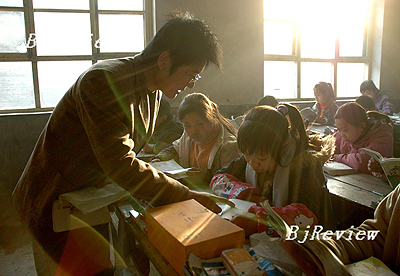|

Double Standards of Going Green
China's State Environmental Protection Administration recently criticized three multinationals for violating environmental rules of China. Moreover, according to the nongovernmental Institute of Public and Environmental Affairs, more than 260 transnational corporations have been found responsible for water pollution and over 50 responsible for air pollution in China.
Low environmental protection standards and lesser punishment for polluters are very attractive to enterprises eager to cut production costs. As a result, many multinationals well-known for the good environmental protection records in other parts of the world are found violating China's environmental rules. They seem to follow double standards when it comes to pollution control. While consuming a huge amount of energy and resources and making enormous profits, these companies are leaving serious pollution behind in China.
Trying to avail themselves of China's cheap labor force and lax environmental policies, multinationals are rushing into the country. Actually, 60 percent of China's trade surplus with other countries should be attributed to these companies, which means, in most cases, while China is blamed for trade imbalance, it is the Western countries that benefit from the profits.
Thus, for a sound ecological environment and also for optimal trade structure, China should take a tough stance on curbing multinationals' pollution. It's unfair to let them take away profits while leaving pollution behind.
Guangzhou Daily
A Law Unto Themselves
On January 8, a passerby was beaten to death by local urban management officers in Tianmen City, central China's Hubei Province, for making a video with his cellphone of these officials abusing local villagers.
In many cities, local urban management authorities have done a lot to improve the poor image of their inspectors, but it seems that the problem is rooted in the entire management system and thus no tangible improvements are seen at all.
The enormous power granted to urban management officers makes the situation worse. The officers belong to neither the police nor industrial and commercial law enforcement agencies, but they are free to punish and fine street peddlers or anyone who is suspected of damaging the urban landscape.
To avoid further violence in urban management, specific guidelines and limitations of the officers' power are needed to standardize their operation.
Yanzhao Metropolis Daily
Power Without Responsibility
After probing into its performance record, the local price regulator in south China's Guangdong Province found that the state-owned power grid company operating in the province made an exceptionally high profit of 14.2 billion yuan (about $2 billion) in 2007. It is also found in the investigation that, the electricity distributor's rate of return on assets hit 11 percent last year, much higher than the 6-8 percent average level in the world. On this basis, Guangdong decided to cut retail prices of electricity.
Although the cut can only lower the price of each kwh of electricity by 0.01 yuan, it might lead to a rectification of the ailing business model of monopoly industries.
In 2007, while registering a 50-percent profit increase, power enterprises still demanded price increases. They enjoy policy protection, but they are not ready to shoulder social responsibilities. Besides, the allegedly rising operational costs are by no means transparent, with no effective supervision.
Price increases are now a trend when it comes to the power industry. In response, a thorough and effective cost and profit auditing system must be adopted as soon as possible to make these formerly "privileged" companies take on their due responsibilities.
Modern Express
Reward Ex Rural Teachers
Since 2006, in accordance of a plan devised by the Ministry of Education, 448,000 substitute teachers, mostly working in rural elementary and primary middle schools, have been dismissed. In less developed western regions, some layoffs were only compensated with less than 800 yuan ($110).
Rapid social development requires that teaching need more qualified people. China now has enough certified teachers, meaning substitute teachers are surplus to requirements. However, these substitute teachers, who have spent the best part of their lives teaching the country's youth, do not deserve being dismissed with such meager compensation.
When China was lacking teachers in the vast rural areas, it is these substitute teachers who spent years or even decades on rural education. They live on small wages, in remote and backward environments, and with no social or medical security. Now, most of them have reached middle age, and are almost incapable of doing other jobs as they have only known teaching all their lives. Thus, the dismissal poses a big question.
The current compensation for dismissed substitute teachers is far from enough to ensure them a decent life in the coming years, which is disproportionably low compared to their great contribution to the country's rural education. It's now an urgent task to provide these middle-aged teachers with certain social security, to prevent them from being thrown into an even more helpless situation.
Dazhong Daily | 